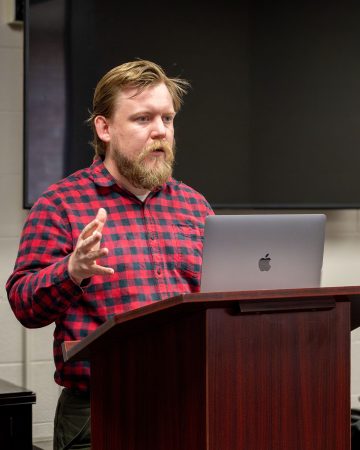What:
The RTC Research Forum, formerly known as the RTC Brown Bag, is a colloquium series sponsored by the Rhetoric, Theory, and Culture graduate program in the Michigan Tech Department of Humanities. Each month, faculty and students in the program present research on a wide range of topics. The forum offers an opportunity for colleagues and peers to discuss current research, prepare for formal conference presentations, and for students to receive feedback on presentation practices.
Abstract:
This essay concerns contributions made by David Braine in Language and Human Understanding (2014) and their bearing on contemporary discussions of artificial intelligence. The first is his proposal that human linguistic capacity has the shape of sense as understood by James J Gibson, where senses must be understood in their relation to the organism as a whole, and that organism must be understood in relation to its environment. The second is his understanding of Wilhelm von Humboldt’s famous line that “language makes infinite use of finite means,” where he takes the infinity to mean indefinite, contrary to the more common recursive interpretation. These contribute to a third regarding malleability and the brain, where its plasticity reaches such an extent that pragmatics and semantics begin to determine, rather than be determined by, neurological structures. Braine takes this malleability to be distinctively human. From the view of 2014, he argued “it will still never be possible for the statements of linguistic science to enable one to calculate or compute the linguistically public significance or sense of the utterances we make” (149). Here I assume Braine’s three contributions, but put pressure on his proposition of computational-impossibility in light of the advances in artificial intelligence in the years since. From the view of today, Braine’s account of malleability reads as anticipatory of LLMs. I argue that the primary intuition-pump he uses to explain malleability cannot differentiate what’s distinctly human from contemporary machine learning attempts. I question whether it matters whether the significance is computable, or if probabilistic attempts can approximate said significance to an arbitrary degree; I argue Braine’s view can defend against this. I also consider advancements in embodied and multimodal reasoning, and whether they can imitate the environmentally oriented nature of speech in Braine’s proposal; I consider this the strongest possibility for defending the uniqueness of language.
Who:
Presented by RTC PhD student Ronald Klingler.
Ronald Klingler is a PhD student in the Rhetoric, Theory, & Culture program. He considers the positions around the uniqueness of human language use, and evaluates them in light of recent advances in artificial intelligence.
All are welcome to attend!
When:
Friday, October 24, 2025
Where:
Petersen Library, Walker Arts & Humanities Center

